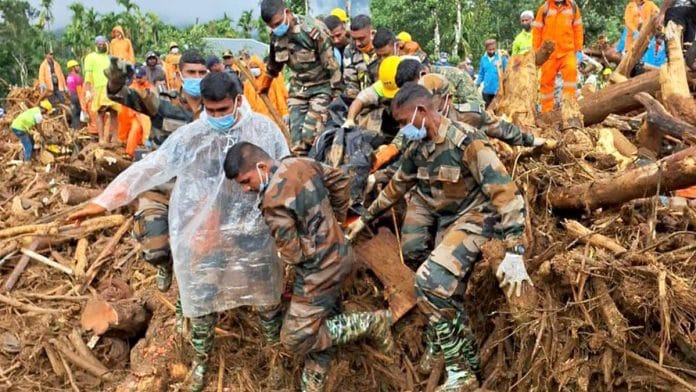New Delhi: More clarity and convergence in the roles of authorities and committees working in the field of disaster management, creation of a disaster database at the national and state-level and provision for constitution of an “Urban Disaster Management Authority” for state capitals and large cities having municipal corporations — these are the key takeaways of the Disaster Management (Amendment) Bill, 2024, introduced in the Lok Sabha Thursday.
According to the statement of objectives of the bill, it was important to bring in the amendment to strengthen the working of the National Disaster Management Authority (NDMA) and the State Disaster Management Authorities (SDMA) to prepare disaster plans at the national and state-level, respectively, instead of plans made by the National Executive Committee and the State Executive Committees that currently manage disaster situations.
The bill seeks to create a “disaster database at the national and state-level” which will include disaster assessment, fund allocation details, expenditure, preparedness and mitigation plans, risk observance according to type and severity of risk, and such other relevant matters, in accordance with such policy as may be determined by the central government.
Further, the bill seeks to provide statutory status to certain pre-Act (National Disaster Management Act, 2005) organisations like the National Crisis Management Committee and an inter-ministerial high-level committee, for approval of financial assistance to states.
Opposing the bill, senior Congress leader Manish Tewari said the law’s legislative power should be properly defined. He added that any law based on “derived legislative power” may not stand the test of constitutionality.
According to Tewari, none of the entries in List 1 (Union List) or List 2 (State List) of the Constitution pertaining to central and state subjects deal with the issue of disaster management. He said the government should amend the concurrent list (List 3) to have a proper entry which covers disaster management in total.
“When a disaster happens, the first responders are the local authorities. It is essential that whichever law is made, the legislative power should be defined,” he said.
He alleged that the rule-making power of the Centre provided in the bill encroached upon the powers of the states.
Minister of State for Home Nityanand Rai, who introduced the Disaster Management (Amendment) Bill, however, asserted that there was no interference in the rights of the states and disaster management was the first responsibility of the states.
Tewari also said that the legislation suffered from excessive delegation, which means the rule-making power which has been given to the central government encroaches upon the domain of the state governments.
“Every state government will have the power to allow its municipal corporation to make disaster management plans, except for Delhi and Chandigarh. Why? Isn’t this an assault on federalism and against the principal of federalism?” he asked.
Also Read: It’s time to survey — not mosques, but fire-trap buildings. Delhi’s Mundka tragedy shows
Bill provisions
The draft bill empowers the central government to make rules with respect to terms and conditions of service and appointment of officers, other employees, consultants and experts in the NDMA.
It further talks of bringing the existing National Crisis Management Committee, a nodal body to deal with major disasters, under the National Disaster Management Act and also the high-level committee under the Act, for approval of financial assistance.
The bill seeks to empower the National Executive Committee by retaining coordination and response-related functions and assigning new functions to it, in case of disasters or a threatening disaster situation affecting more than one state.
Further, the bill seeks to assign the coordination, preparation and approval of state plans to the State Disaster Management Authority.
The draft bill seeks to clearly “demarcate the functions of the National Disaster Management Authority and the National Executive Committee and to insert new clauses by shifting certain responsibilities of the ministries or departments of the Government of India towards the National Executive Committee”.
It also seeks to empower the state government on its own or on the directions of the central government to take disciplinary action against any officer on the grounds of insubordination or dereliction of duty etc. during a disaster, with a provision that the action taken by the state government shall not be inconsistent with the directions given by the central government in this regard.
The bill seeks to insert a new Section 60A to empower the central and state governments to direct any person to take any action or refrain from taking any action for reducing the impact of a disaster. If any person violates the provision, a penalty not exceeding Rs 10,000 can be imposed.
In the Lok Sabha Thursday, Saugata Ray of the Trinamool Congress said the “multiplicity of authorities” and creation of several heads will create confusion and delay relief and rescue work.
(Edited by Nida Fatima Siddiqui)
Also Read: Lapsed licence, no fire exit & oxygen refilling — why Delhi hospital fire was disaster-in-waiting






